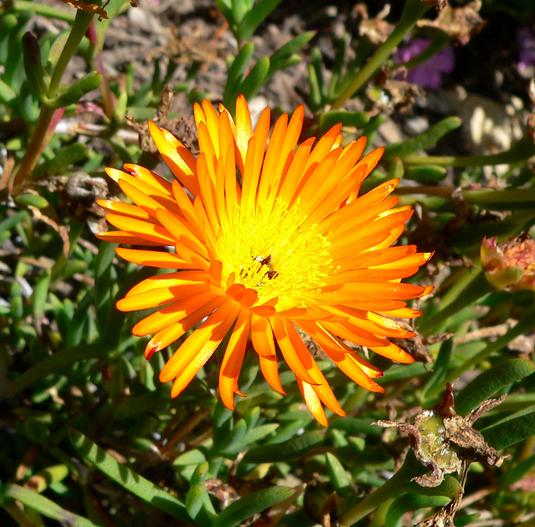Bush Ice-Plant
(Lampranthus glaucoides)
Bush Ice-Plant (Lampranthus glaucoides)
/
/

Stan Shebs
CC BY-SA 3.0
Image By:
Stan Shebs
Recorded By:
Copyright:
CC BY-SA 3.0
Copyright Notice:
Photo by: Stan Shebs | License Type: CC BY-SA 3.0 | License URL: https://creativecommons.org/licenses/by-sa/3.0 | Uploader: Stan Shebs | Publisher: Wikipedia Commons























Estimated Native Range
Summary
Lampranthus glaucoides, commonly known as Bush Ice-Plant, is an evergreen succulent or subshrub native to the arid and semi-arid regions of South Africa, particularly the Western Cape. It is adapted to rocky outcrops and sandy plains where it forms part of the unique fynbos vegetation. The plant typically grows to a height of 0.1 to 0.3 meters (0.3 to 1.0 ft) and has a compact, rounded habit. Its fleshy, blue-green leaves are adapted to store water, making it drought-tolerant. From late winter to spring (August to October in its native hemisphere), it produces a profusion of daisy-like flowers that range in color from bright orange to yellow, which are highly attractive when they open fully in the sun, earning them the name "noon flowers."
Bush Ice-Plant is valued for its drought tolerance and vibrant floral display, making it suitable for rock gardens, coastal gardens, and as ground cover in dry, sunny areas. It is also used in xeriscaping, a landscaping method that reduces or eliminates the need for supplemental water. While it thrives in well-drained sandy soils, it does not perform well in heavy clay soils. It requires full sun exposure to flourish and minimal watering once established, reflecting its adaptation to arid environments. However, its potential to become invasive when introduced to similar climates, such as in Western Australia and New Zealand, should be noted, and it should be planted with caution outside its native range.CC BY-SA 4.0
Bush Ice-Plant is valued for its drought tolerance and vibrant floral display, making it suitable for rock gardens, coastal gardens, and as ground cover in dry, sunny areas. It is also used in xeriscaping, a landscaping method that reduces or eliminates the need for supplemental water. While it thrives in well-drained sandy soils, it does not perform well in heavy clay soils. It requires full sun exposure to flourish and minimal watering once established, reflecting its adaptation to arid environments. However, its potential to become invasive when introduced to similar climates, such as in Western Australia and New Zealand, should be noted, and it should be planted with caution outside its native range.CC BY-SA 4.0
Plant Description
- Plant Type: Succulent, Subshrub
- Height: 0.5-1.5 feet
- Width: 2-3 feet
- Growth Rate: Moderate
- Flower Color: Orange, Yellow
- Flowering Season: Summer
- Leaf Retention: Evergreen
Growth Requirements
- Sun: Full Sun
- Water: Low, Very Low
- Drainage: Medium
Common Uses
Bee Garden, Bird Garden, Butterfly Garden, Deer Resistant, Drought Tolerant, Fire Resistant, Groundcover, Low Maintenance, Salt Tolerant, Showy Flowers
Natural Habitat
Arid and semi-arid regions of South Africa, particularly the Western Cape, as part of the fynbos vegetation
Other Names
Common Names: Trailing Ice Plant, Orange Glansblomma
Scientific Names: , Lampranthus aurantiacus, Lampranthus glaucoides, Mesembryanthemum aurantiacum, Mesembryanthemum aurantium, Mesembryanthemum glaucoides,
GBIF Accepted Name: Lampranthus glaucoides (Haw.) N.E.Br.